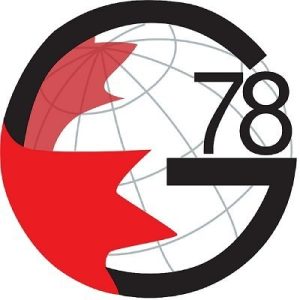- Home
- Canada’s Feminist International Assistance Policy After Eight Years: What Have We Learned So Far?
Canada’s Feminist International Assistance Policy After Eight Years: What Have We Learned So Far?
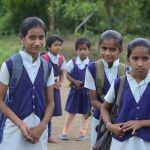
Event Date: September 29, 2025 - 3:30pm to 5:00pm
Location: FSS 4004 and online, 120 University Private, University of Ottawa
Presented by CIPS, the Gender, Peace, and Development Research Network (GPD-RN), the Research Network on Women, Peace and Security and the Group of 78
Canada’s Feminist International Assistance Policy (FIAP) was announced in 2017, followed by several other commitments in support of Canada’s Feminist Foreign Policy. For example, “the women, peace and security agenda is at the heart of Canada’s Feminist Foreign Policy, which includes the Feminist International Assistance Policy and Defence Policy” (Government of Canada, 2024). After eight years of programming, debates, and multisectoral discussions, it is an important moment for reflection on what we have learned so far from Canada’s FIAP.
This event adds to a rich and detailed analysis of policy rhetoric by focussing on some of the practical experiences of organizations tasked with implementation of programming under the FIAP, as well as critical and analytical insights from scholars and practitioners.
The panel builds on earlier events organized by the Gender, Peace and Development Research Network and the Centre for International Policy Studies (CIPS) including the April 30, 2025 event by emerging scholars titled “What Can We Learn From How Canada’s FIAP is Landing in Latin America and the Caribbean?”. One of the major themes that emerged from this previous event was the importance of a feminist approach to development as described by the partner organizations in Haiti, Jamaica/CARICOM and Colombia, particularly when combined with a commitment to connecting to local feminist priorities from partner countries. See, also, the June 6, 2025 blog by these presenters.
Other important insights on feminist foreign policy enrich our discussion on Canada’s FIAP including the September 11, 2025 event on Strengthening the Representation of Women in Diplomacy: Challenges and Policy Solutions; the August, 2025 Policy Brief by Lilly Nicholls titled How FIAP Broke Glass Ceilings in Canadian Diplomacy – And Should Go Further; and Beth Woroniuk’s August 21, 2025 analysis: Canada, Financing for Development and Gender Equality: Looking for Leadership.
The Gender, Peace and Development Research Network (as part of the Centre for Policy Studies at the University of Ottawa) and the Group of 78 invite you to join us for this important new conversation where we will reflect on some of the successes of programs funded under FIAP, lessons learned, and priorities for future initiatives.
Panel Presenters:
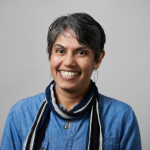 Rita Morbia is a co-manager at Inter Pares. She works on issues related to women’s rights, feminist movement-building, and health, including sexual and reproductive rights, in Canada, Africa and Asia. She currently works with activists, particularly in the Philippines and Sudan, on access to healthcare, bodily autonomy and women’s political participation. Rita currently serves as Co-Treasurer to the Canadian Health Coalition, an organization dedicated to protecting and expanding Canada’s public health care system.
Rita Morbia is a co-manager at Inter Pares. She works on issues related to women’s rights, feminist movement-building, and health, including sexual and reproductive rights, in Canada, Africa and Asia. She currently works with activists, particularly in the Philippines and Sudan, on access to healthcare, bodily autonomy and women’s political participation. Rita currently serves as Co-Treasurer to the Canadian Health Coalition, an organization dedicated to protecting and expanding Canada’s public health care system.
 Eileen Alma is the Executive Director at Coady Institute, St. Francis Xavier University. She has been with Coady since 2013 and previously held the position of Director, International Centre for Women’s Leadership at Coady Institute, overseeing programming and partnerships on women’s leadership and gender equality nationally and internationally including initiatives for Indigenous women leaders and communities, and the development of the Circle of Abundance program initiative. Eileen has 30 years of interdisciplinary experience in international program development, management, research and practice. Prior to joining Coady Institute, Eileen worked with the International Development Research Centre (IDRC) for twenty years, most recently as a Program Officer in the area of Social and Economic Policy. Eileen is currently the Co-Chair of the Board of Directors for Cooperation Canada, a national organization representing more than 90 civil society organizations across Canada working in the international development and humanitarian sector. Locally in Antigonish, Nova Scotia, she is currently Board Chair for the Friends of the Antigonish Library (FoAL). Eileen holds a master’s degree in Conflict Analysis and Management (ethno-political) from Royal Roads University, a Master’s Certificate in Project Management from Royal Roads University.
Eileen Alma is the Executive Director at Coady Institute, St. Francis Xavier University. She has been with Coady since 2013 and previously held the position of Director, International Centre for Women’s Leadership at Coady Institute, overseeing programming and partnerships on women’s leadership and gender equality nationally and internationally including initiatives for Indigenous women leaders and communities, and the development of the Circle of Abundance program initiative. Eileen has 30 years of interdisciplinary experience in international program development, management, research and practice. Prior to joining Coady Institute, Eileen worked with the International Development Research Centre (IDRC) for twenty years, most recently as a Program Officer in the area of Social and Economic Policy. Eileen is currently the Co-Chair of the Board of Directors for Cooperation Canada, a national organization representing more than 90 civil society organizations across Canada working in the international development and humanitarian sector. Locally in Antigonish, Nova Scotia, she is currently Board Chair for the Friends of the Antigonish Library (FoAL). Eileen holds a master’s degree in Conflict Analysis and Management (ethno-political) from Royal Roads University, a Master’s Certificate in Project Management from Royal Roads University.
 Shaheen Anam is a Bangladeshi human rights activist and the Executive Director of Manusher Jonno Foundation. Anam has worked for the United Nations High Commissioner for Refugees and the United Nations Development Programme in Bangladesh. She is associated with the BRAC Institute of Governance and Development. She is a coordinator of the South Asian Women’s Network on Skills, Livelihood and Entrepreneurship Development. Anam received an Honorary Member of the Most Excellent Order of the British Empire from the government of the United Kingdom in February 2025.
Shaheen Anam is a Bangladeshi human rights activist and the Executive Director of Manusher Jonno Foundation. Anam has worked for the United Nations High Commissioner for Refugees and the United Nations Development Programme in Bangladesh. She is associated with the BRAC Institute of Governance and Development. She is a coordinator of the South Asian Women’s Network on Skills, Livelihood and Entrepreneurship Development. Anam received an Honorary Member of the Most Excellent Order of the British Empire from the government of the United Kingdom in February 2025.
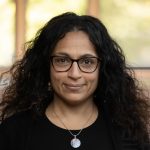 Sheila Rao is a socio-cultural anthropologist and international cooperation consultant specializing in feminist analysis of organizational change, development policies and food systems research. She teaches on gender and social change, cultural anthropology, and food justice, and writes about organizational change, development policies, food sovereignty and the ethics of care in agroecology. Based in Ottawa, She currently works with the Centre for Indigenous Conservation and Development Alternatives (CICADA) based at McGill University and works closely with Seed Change as their gender advisor for their East Africa project, Rural Women Cultivating Change (RWCC). Dr. Rao regularly consults with international organizations working to strengthen feminist practice and movements, and food systems change. She currently serves on the Board of Directors with Farm Radio International.
Sheila Rao is a socio-cultural anthropologist and international cooperation consultant specializing in feminist analysis of organizational change, development policies and food systems research. She teaches on gender and social change, cultural anthropology, and food justice, and writes about organizational change, development policies, food sovereignty and the ethics of care in agroecology. Based in Ottawa, She currently works with the Centre for Indigenous Conservation and Development Alternatives (CICADA) based at McGill University and works closely with Seed Change as their gender advisor for their East Africa project, Rural Women Cultivating Change (RWCC). Dr. Rao regularly consults with international organizations working to strengthen feminist practice and movements, and food systems change. She currently serves on the Board of Directors with Farm Radio International.
 Brianna Parent-Long is a Policy and Advocacy Officer at Action Canada for Sexual Health and Rights and a PhD Candidate in the Department of Political Science at Carleton University. Her research and professional interests include Canadian foreign aid policy, the global advancement of sexual and reproductive health and rights, feminist civil society movements, and the impact of anti-gender actors. Specifically, her dissertation examines how Canadian development NGOs have navigated shifting foreign aid priorities alongside the growing influence of anti-gender movements.
Brianna Parent-Long is a Policy and Advocacy Officer at Action Canada for Sexual Health and Rights and a PhD Candidate in the Department of Political Science at Carleton University. Her research and professional interests include Canadian foreign aid policy, the global advancement of sexual and reproductive health and rights, feminist civil society movements, and the impact of anti-gender actors. Specifically, her dissertation examines how Canadian development NGOs have navigated shifting foreign aid priorities alongside the growing influence of anti-gender movements.
Discussants:
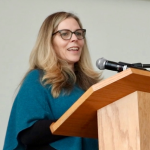 Rebecca Tiessen is Professor in the School of International Development and Global Studies at the University of Ottawa, Past-President of the Canadian Association for the Study of International Development (CASID), co-Director of the Gender, Peace and Development Research Network (uOttawa) and co-Director of the Research Network on Women, Peace and Security (national). Her areas of specialization include gender equality and women’s empowerment, Canadian foreign aid policy, feminist foreign policy, and volunteering for development. Her recent research examines the role and impact of transnational actors on gender equality outcomes in the Global South. She has edited several books and published many articles in journals including the Canadian Journal of Development Studies where she edited a Special Issue on Feminist Flourishing.
Rebecca Tiessen is Professor in the School of International Development and Global Studies at the University of Ottawa, Past-President of the Canadian Association for the Study of International Development (CASID), co-Director of the Gender, Peace and Development Research Network (uOttawa) and co-Director of the Research Network on Women, Peace and Security (national). Her areas of specialization include gender equality and women’s empowerment, Canadian foreign aid policy, feminist foreign policy, and volunteering for development. Her recent research examines the role and impact of transnational actors on gender equality outcomes in the Global South. She has edited several books and published many articles in journals including the Canadian Journal of Development Studies where she edited a Special Issue on Feminist Flourishing.
 Loretta Baidoo is a PhD candidate in the School of International Development and Global Studies at the University of Ottawa. Her interests and experiences centre on feminist, decolonised, strength-based, and community-led approaches. Loretta’s doctoral dissertation examines the impact of the Canadian and German feminist development policies in relation to national gender policies in the Global South, exploring translation, implementation, and the pursuit of transformative gender equality outcomes.
Loretta Baidoo is a PhD candidate in the School of International Development and Global Studies at the University of Ottawa. Her interests and experiences centre on feminist, decolonised, strength-based, and community-led approaches. Loretta’s doctoral dissertation examines the impact of the Canadian and German feminist development policies in relation to national gender policies in the Global South, exploring translation, implementation, and the pursuit of transformative gender equality outcomes.
Social Sciences Building
Subscribe to the CIPS Newsletter
No spam, only authentic content.




